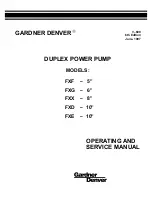
E-4
English
5
5 Set-up
5.1
General Information
The unit may only be installed indoors in rooms with low humidity
on a level, smooth and horizontal surface. The entire base of the
frame should lie directly on the floor to ensure a good soundproof
seal. If this is not the case, additional sound insulation measures
may be necessary.
The heat pump must be installed so that maintenance work can
be carried out without being hindered. This can be ensured by
maintaining a clearance of approx. 1 m in front of and on each
side of the heat pump.
5.2
Sound Emissions
The heat pump operates silently due to efficient sound insulation.
To prevent noise transmission to the foundation, a suitable,
sound dampening rubber mat should be placed underneath the
base frame of the heat pump.
To prevent any sound from being transmitted to the heating sys-
tem, we recommend connecting the heat pump to the heating
system by means of hose sections.
6 Installation
6.1
General Information
The following connections need to be established on the heat
pump:
Flow and return flow of the well system
Flow and return flow of the heating system
Power supply
6.2
Heating System Connection
ATTENTION!
Flush the heating system prior to connecting the heat pump.
Before connecting the heating water system to the heat pump,
the heating system must be flushed to remove any impurities,
residue from sealants, etc. Any accumulation of deposits in the
liquifier could cause the heat pump to completely break down.
Once the heating system has been installed, it must be filled, de-
aerated and pressure-tested.
Minimum heating water flow rate
The minimum heating water flow rate through the heat pump
must be assured in all operating states of the heating system.
This can be accomplished, for example, by installing either a
manifold without differential pressure or an overflow valve. The
procedure for adjusting an overflow valve is described in the
Chapter Start-up.
Antifreeze protection for installation locations
prone to frost
The antifreeze function of the heat pump controller is active
whenever the controller and the heat circulating pumps are ready
for operation. If the heat pump is taken out of service or in the
event of a power failure, the system has to be drained. The heat-
ing circuit should be operated with a suitable antifreeze if heat
pump systems are implemented in buildings where a power fail-
ure can not be detected (holiday home).
6.3
Heat Source Connection
The following procedure must be observed when connecting the
heat source:
Connect the well pipes to the heat pump flow and return flow.
ATTENTION!
The well water must comply with the required water quality standards.
The hydraulic plumbing diagram must be adhered to.






































